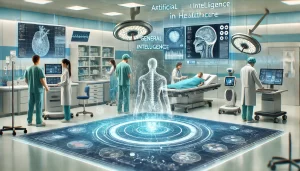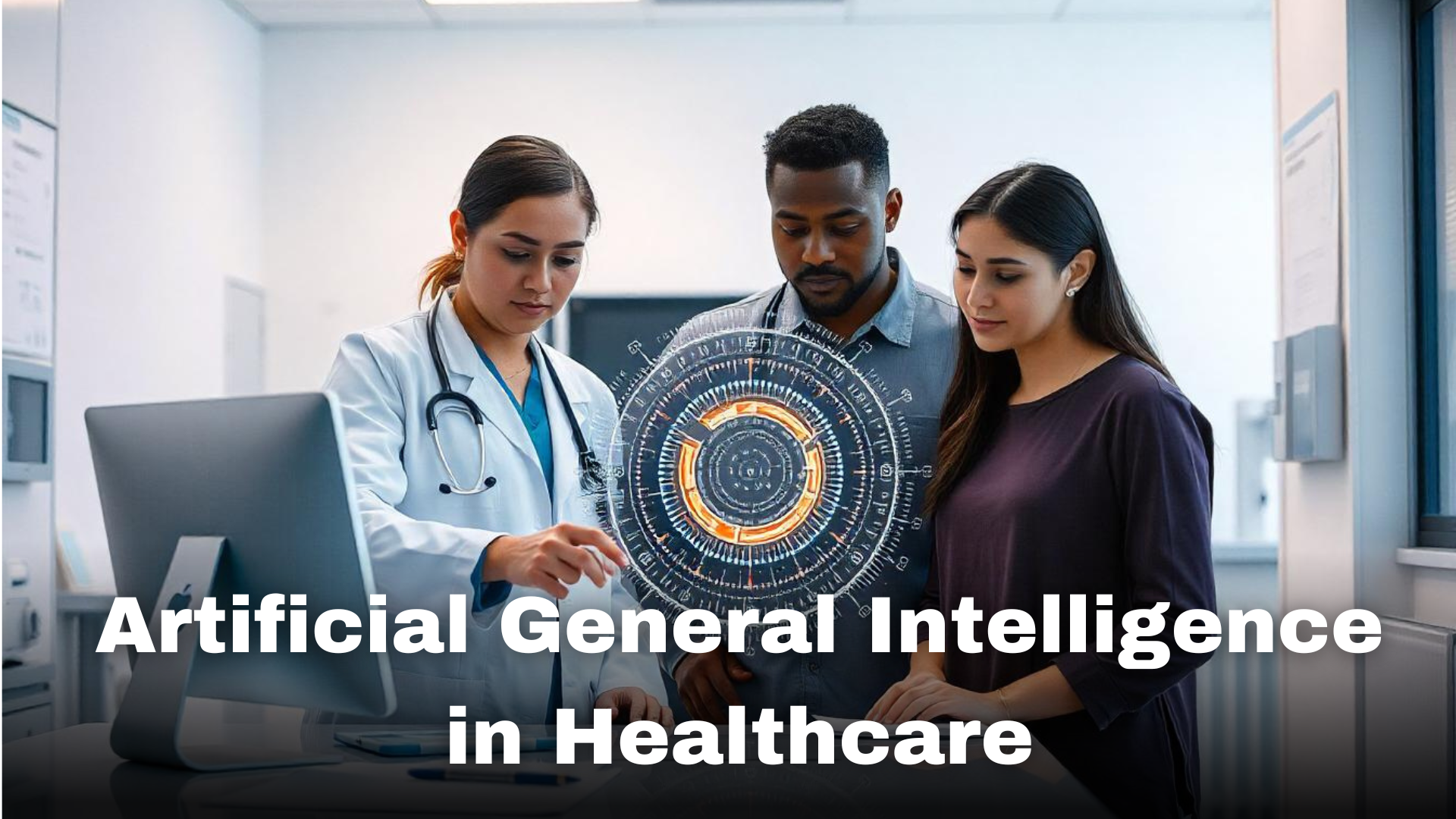Artificial General Intelligence in Healthcare: The Future of Medicine
While AI has already played a vital force in healthcare transformation, the next leap is going to be much more revolutionary in nature: Artificial General Intelligence (AGI). This will be fundamentally different from the type of intelligence we possess today with current systems of AI, which have become excellent at one specific task, such as diagnosing diseases or analyzing medical images or predicting outcomes of patients. The vision for AGI is to mimic human-like intelligence to offer much more adaptive problem-solving in multidomain work. AGI in healthcare could redefine approaches to how we diagnose, treat, care for patients, and even manage systems in healthcare.
 This blog is dedicated to illuminating what AGI is, its distinctions from traditional AI, and the profound impact it could have on the healthcare industry.
This blog is dedicated to illuminating what AGI is, its distinctions from traditional AI, and the profound impact it could have on the healthcare industry.
What is Artificial General Intelligence (AGI)?
Whereas narrow AI is mainly designed to perform one specific task- such as diagnosing skin cancer from images or forecasting risks of heart disease-Army General Intelligence (AGI), on the other hand, deals with a form of AI that can do any intellectual thing that humans can do. AGI can learn, reason, understand context, and adapt to new situations in a much more flexible and holistic manner compared with the current AI systems.
While AGI is still on paper and not yet realized, the potential it offers for healthcare is nothing but superb. It is almost like having an intelligent system that not only diagnoses a disease but also is in a position to understand the patient’s background, lifestyle factors, genetics, and then design a treatment plan tailored to the individual, which evolves with the changing condition of the patient. That is what AGI promises.
How AGI Can Transform Healthcare
1. Precision Diagnostics
The current AI systems in healthcare are performing very well in diagnostic tasks, but AGI might bring diagnostics to a whole new level. The AI models developed today are often special-purpose-one might be superb at reading X-rays and another might be excellent at analyzing genetic data. All these capabilities would come together into one system when one develops an AGI. It would consider lab results, lifestyle choices, mental health, and genetics to form a holistic patient profile.
 Example: If a patient presents with symptoms of fatigue, an AGI system would not stop looking for common culprits like anemia or problems with thyroid condition. It also may look at more subtle culprits than genetic predispositions or mental disorders as a result of environmental stressors which a traditional AI might miss by design.
Example: If a patient presents with symptoms of fatigue, an AGI system would not stop looking for common culprits like anemia or problems with thyroid condition. It also may look at more subtle culprits than genetic predispositions or mental disorders as a result of environmental stressors which a traditional AI might miss by design.
2. Personalized Medicine
AGI can revolutionize personalized medicine where the treatment is uniquely tailored to an individual’s biology. As of now, AI systems are driven by algorithms fed through large databases and consequently identify patterns and predict outcomes. AGI can examine a patient’s full spectrum of data-genomic, environmental, behavioral, and clinical-and update the treatment accordingly as more new data comes its way.
Example: In the case of cancer treatment, AGI will not only decide which therapy is best for a specific tumor’s genetic makeup but also adapt real-time changes in the response of the patient to the treatment such that dosing is optimized and side effects minimized.
3. Advanced Robotic Surgery
Currently, narrow AI assists robots in complex operations with very high accuracy for surgical robots. However, with the full achievement of AGI, the complex offerings of robotic surgery will be enhanced many folds as the robots can actually think and change their plans within surgery. This means that the AGI-enabled robots might be able to make real-time decisions or act in case of some unprecedented complication; these robots might even learn from previous surgeries to further enhance the results with time.
Example: If an unexpected case of uncontrolled bleeding is encountered while performing robotic-assisted heart surgery, an AGI system can analyze the situation, scan millions of similar cases, and make immediate recommendations for going forward, optimized for the patient’s safety and recovery.
4. Improving Administrative Functions Besides being used clinically, AGI will evolutionally assist in improving the health care system in absolute terms of the smoothness of administrative functions such as scheduling and billing, as well as resource management. The deployment of resources-staff, rooms, and equipment-can be made dynamically in relation to patient flow, which eliminates waiting times and improves patients’ experience.

In short, for instance, an AGI system could automatically forecast patient inflow by having access to historical data and external influences such as weather or the trend for public health, and then could automatically modulate the number of required staff and resources’ allocation in order to have the optimal care inputted.
5. Reinventing Drug Discovery
The discovery of drugs is a long and expensive process; however, AGI would flip it around by speeding up research and development. AGI systems would analyze available data but also create new hypotheses, run simulations, and even design new drugs to simply this entire discovery process by years.
Example: For diseases such as Alzheimer’s, for which there currently do not exist effective treatments, AGI can scan all of the biological information currently available, research the effect of environmental influences and simulate thousands of potential treatments, saving time to market for new therapies by many months or years.
Ethical Issues in AGI Medicine
AGI has tremendous potential to impact healthcare, but with that potential comes a myriad of ethical issues.
1. Data Privacy and Security
AGI systems would, after all, require access to large amounts of personal health data. Data protection and security would, therefore be of utmost importance. But will AGI systems know how to store, share, and make use of that kind of sensitive information? Appropriate regulatory frameworks along with sound cybersecurity measures will become important handles in protecting patient data.
2. Bias and Fairness
As with other AI, biased information could perpetually feed into AGI, and consequently, the output may become either a product that continues or intensifies existing biases. Whether regarding healthcare choices, issues of fair treatment regardless of race or gender, or socioeconomic status, developers will need to provide answers concerning AGI.
3. Accountability
This will be increasingly complex where the question of decision-making authority lies with a system that has AGI capabilities, and in whose regard, say, the developers or healthcare providers are accountable. Little question then that new or more sharply defined legal or ethical frameworks must evolve to satisfactorily clarify these questions of responsibility and accountability.
Challenges in AGI Deployment in Health Care
AGI indeed has a great potential in health care. However, still a lot has to be overcome in order to harness the full potential of AGI: technological barriers first, since the current systems of AI are far from being similar to general intelligence.
- General leaps in machine learning, neural networks, and computational power need to be exhibited to come up with AGI systems.
- Data Integration: AGI systems will require accessing vast diverse datasets in order to be productive. Stark challenges continue to emerge in the integration of clinical data from multiple sources: medical records, labs, and wearable devices, etc.
- Regulatory Approval: AGI-based solutions are going to require advancements in regulatory frameworks. Deploying such technologies creates a necessary pathway to slow-paced movement since its novelty spawns demands for being extensively tested before use so as to ensure patient safety.
Conclusion: A New Healthcare Era
Artificial General Intelligence will usher in a new era of healthcare that’s more personalized, efficient, and adaptive than ever before. Precision diagnostics and personalized medicine, robotic surgery and drug discovery-all these and much more await modernization through AGI. But realization of all this presupposes an enormous effort to overcome the overwhelming technological, ethical, and regulatory challenges that stand in its way.
We are still decades away from the dream of full-fledged AGI in healthcare, but the journey to the goal is already shaping the future of medicine. The industry will commoditize narrow AI now and for years to come; however, the advent of AGI is what would bring a new era-the health care that is intelligent, proactive, and patient-centric.
As we move into the future, it is necessary to ponder not only the technological impacts of AGI but also the ethical, legal, and societal implications it would raise. Proper development and planning could potentially make AGI the most potent tool in the healthcare toolkit, transforming lives and improving results on a gigantic scale.
Important Link
- How did Kris Kristofferson die
- How to sign in bank of America online
- Millie Bobby Brown and Jake Bongiovi: A Love Story for the Ages
- India Women vs South Africa Women Cricket Match 2024
- Is Iran attacking Israel
- What happened to John Amos
- How many leagues are there in sports
- What are sports leagues
- How many times India beat Bangladesh?




